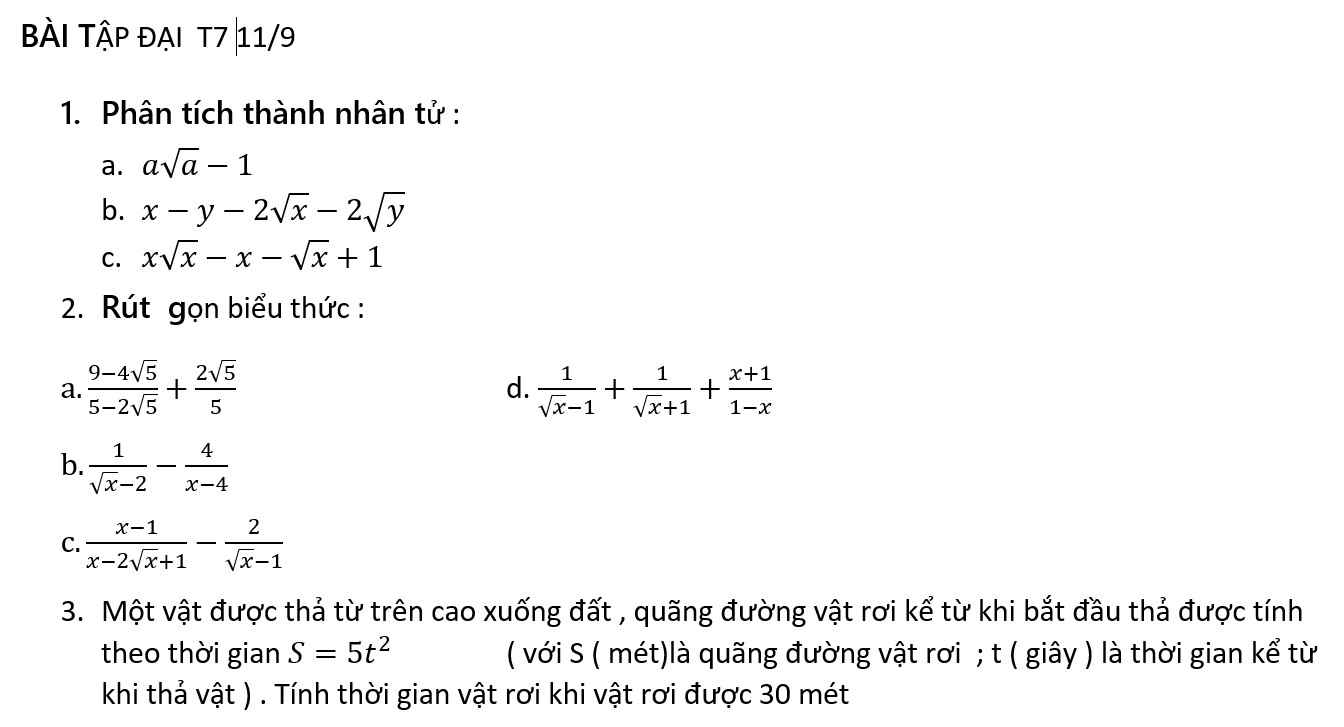Các bạn giúp mình những câu này với ạ.

Hãy nhập câu hỏi của bạn vào đây, nếu là tài khoản VIP, bạn sẽ được ưu tiên trả lời.




Câu 7
a)
Gọi nCu = x
nFe = y
=> 64x + 56y = 18,4 (1)
Bảo toàn e
2x + 3y = 2nSO2 = 2.\(\dfrac{7,84}{22,4}\) = 2.0,35 = 0,7 (2)
Từ (1) + (2) => x = 0,2 , y = 0,1
=> mCu = 0,2 . 64 = 12,8g
%mCu = \(\dfrac{12,8}{18,4}.100\%=69,57\%\)
%mFe = 100 - 69,57 = 30,43%
b) Để hấp thụ hết SO2
=> \(\dfrac{nOH^-}{nSO_2}=1\)
=> nOH- = 0,35mol
=> nNaOH = 0,35 mol
=> Vdd NaOH = 0,35 : 2 = 0,175 lít = 175 ml

1:
a: Khi m=1 thì (1) sẽ là x^2+2x-5=0
=>\(x=-1\pm\sqrt{6}\)
b: Δ=(2m)^2-4(-2m-3)
=4m^2+8m+12
=4m^2+8m+4+8=(2m+2)^2+8>=8>0
=>Phương trình luôn có hai nghiệm phân biệt
2:
Thay x=-1 và y=2 vào (P), ta được:
a*(-1)^2=2
=>a=2

cảm ơn bạn nhưng bạn trình bày giúp mình được ko ạ mình cảm ơn:3


1, a, \(F=k.\dfrac{\left|q_1q_2\right|}{0,06}=...\)
b, ta thấy \(MA+AB=MB\)
\(E_1=k.\dfrac{\left|q_1\right|}{MA^2}\)
\(E_2=k\dfrac{\left|q_2\right|}{MB^2}\)
\(E=\left|E_1-E_2\right|\)
a,\(R_đ=\dfrac{12^2}{6}=24\left(\Omega\right)\)
\(R_{tđ}=\dfrac{24.12}{12+24}+12=20\left(\Omega\right)\)
\(I.r+20.I=15\Rightarrow I=0,6\left(A\right)\)
\(U=0,6.20=12\left(V\right)\)
\(\Rightarrow I_đ=\dfrac{12-0,6.8}{24}=0,3\left(A\right)\)
\(I_{đđm}=\dfrac{6}{12}=0,5\)
b, P nguồn là \(E.I\)
mạch \(0,6^2.20\)
đấy là ban đầu nhá bh bn đặt R1=x giữ nguyên P nguồn xong tính Rtđ để tìm P mạch thỏa mãn bài
so sánh tự đưa ra kết luận

\(a,=\left(\sqrt{a}-1\right)\left(a+\sqrt{a}+1\right)\\ b,=\left(\sqrt{x}-\sqrt{y}\right)\left(\sqrt{x}+\sqrt{y}\right)-2\left(\sqrt{x}+\sqrt{y}\right)\\ =\left(\sqrt{x}+\sqrt{y}\right)\left(\sqrt{x}-\sqrt{y}-2\right)\\ c,=x\left(\sqrt{x}-1\right)-\left(\sqrt{x}-1\right)=\left(\sqrt{x}-1\right)^2\left(\sqrt{x}+1\right)\)
\(a,=\dfrac{\left(9-4\sqrt{5}\right)\left(5+2\sqrt{5}\right)}{4}+\dfrac{2\sqrt{5}}{5}\\ =\dfrac{5-2\sqrt{5}}{4}+\dfrac{2\sqrt{5}}{5}\\ =\dfrac{25-10\sqrt{5}+8\sqrt{5}}{20}=\dfrac{25-2\sqrt{5}}{20}\\ b,=\dfrac{\sqrt{x}+2-4}{\left(\sqrt{x}-2\right)\left(\sqrt{x}+2\right)}=\dfrac{\sqrt{x}-2}{\left(\sqrt{x}-2\right)\left(\sqrt{x}+2\right)}=\dfrac{1}{\sqrt{x}+2}\\ c,=\dfrac{\left(\sqrt{x}-1\right)\left(\sqrt{x}+1\right)}{\left(\sqrt{x}-1\right)^2}-\dfrac{2}{\sqrt{x}-1}\\ =\dfrac{\sqrt{x}+1-2}{\sqrt{x}-1}=\dfrac{\sqrt{x}-1}{\sqrt{x}-1}=1\\ d,=\dfrac{1}{\sqrt{x}-1}+\dfrac{1}{\sqrt{x}+1}+\dfrac{x+1}{1-x}\)
\(=\dfrac{\sqrt{x}+1+\sqrt{x}-1-x-1}{\left(\sqrt{x}-1\right)\left(\sqrt{x}+1\right)}\\ =\dfrac{2\sqrt{x}-x-1}{\left(\sqrt{x}-1\right)\left(\sqrt{x}+1\right)}\\ =\dfrac{-\left(\sqrt{x}-1\right)^2}{\left(\sqrt{x}-1\right)\left(\sqrt{x}+1\right)}=\dfrac{-1}{\sqrt{x}+1}\)